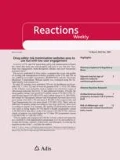Author Information
An event is serious (based on the ICH definition) when the patient outcome is:
* death
* life-threatening
* hospitalisation
* disability
* congenital anomaly
* other medically important event
* First published case report
* Drug interaction
A 4-year old boy developed a syndrome of inappropriate antidiuretic hormone secretion (SIADH) during concomitant administration of itraconazole and vindesine [not all routes stated].
The boy with standard-risk acute lymphocytic leukaemia, started receiving maintenance therapy with 10 cycles of mercaptopurine, methotrexate and vindesine. Each cycle comprised of vindesine 3 mg/m2 every 4 weeks along with mercaptopurine and methotrexate. Additionally, he received intrathecal chemotherapy of methotrexate, cytarabine and dexamethasone. During the cycle 2 of maintenance therapy, he developed a pulmonary fungal infection. Thereafter, he started receiving oral itraconazole 2.5 mg/kg solution, every 12 hours for its treatment. Then, he received vindesine 2.85mg on day 1 of third cycle i.e. 2 September 2015. Five days after the vindesine third cycle, he was hospitalised with abdominal distension and pain, loss of appetite and weight, constipation and paralysis of the extremities. Seven days after the vindesine third cycle, he developed severe neurotoxicity primarily comprising neck rigidity, trismus, rigidity of the extremities. Meanwhile, he developed hypertension, hyponatraemia, chills, fever and vomiting. All of which were the symptoms of SIADH and was attributed to an interaction between itraconazole and vindesine.
Subsequently, the boy's itraconazole therapy was switched to caspofungin and amphotericin B. One week after the alternate anti-fungal drug, he showed signs of neurological recovery. After he recovered from the ADR's, his maintenance therapy continued with a one-third decreased dose of vindesine in the next chemotherapy cycle and administered with itraconazole. A full dose of vindesine was recommended without itraconazole and he successfully completed the chemotherapy.
» Editorial comment:A search of AdisBase, Medline and Embase did not reveal any previous case reports of Syndrome of inappropriate antidiuretic hormone secretion associated with itraconazole and vindesine. The WHO ADR database contained 12 and 3 reports of Inappropriate antidiuretic hormone secretion associated with itraconazole and vindesine, respectively.
Author comment: "Syndrome of inappropriate antidiuretic hormone from co-administration of itraconazole and [vindesine] has not previously been reported to our knowledge." "This is the first report that exemplifies a possible interaction of oral itraconazole solution enhanced [vindesine]-induced SIADH". "[C]o-administration of the CYP3A4 inhibitor, itraconazole, resulted in further prevention of [vindesine] elimination and ultimately increased the intensity of the ADRs."
Reference
Zhou H, et al. Syndrome of inappropriate antidiuretic hormone secretion from concomitant use of itraconazole and vindesine. Journal of Clinical Pharmacy and Therapeutics 43: 137-140, No. 1, Feb 2018. Available from: URL: http://doi.org/10.1111/jcpt.12598 - China
Rights and permissions
About this article
Cite this article
Itraconazole/vindesine interaction. Reactions Weekly 1695, 234 (2018). https://doi.org/10.1007/s40278-018-44061-y
Published:
Issue Date:
DOI: https://doi.org/10.1007/s40278-018-44061-y

